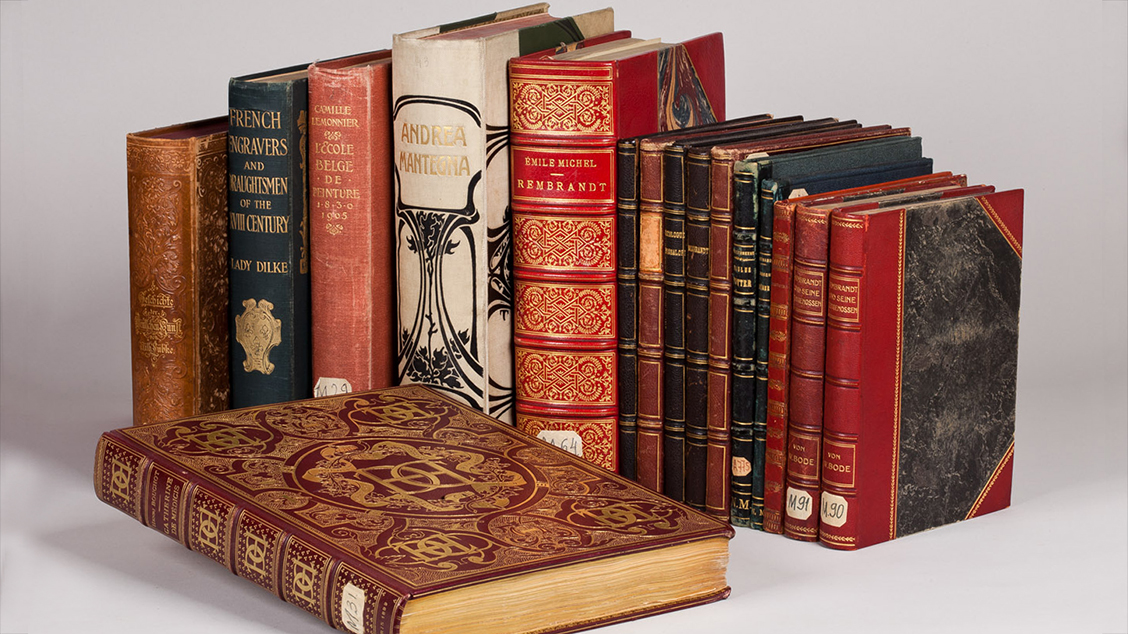Research library of The Pushkin State Museum of Fine Arts houses a rich collection of art publication, such as books, magazine and pamphlets. The library could be accessed in a specialised lecture hall in the Main building of the museum. Furthermore, the research library is an active member of the museum, leading its own research and educational activity.
Library collection and other resources
Our library collection is an important knowledge-management resource formed on the basis of educational and research needs of the Museum. Today, the library owns over three thousand publications and the collection is constantly growing. It houses not only Russian publications, but also foreign editions about history of world art that are integral to research works (especially determining artistic attributions), preparations of educational programs and other professional activities. They include catalogs of museums' and private collections, auction and exhibition catalogs, as well as monographies, catalogues raisonné, artists dictionaries and other various background reference publications.
One of the fundamental parts of our library's research capacity is our online fund of specialised periodic subscription-based issues and digital databases of academic works, such as JSTOR and ProQuest, known to have a renowned compilation of complete research works on art and related disciplines. Access to our online resources is possible in the lecture hall of the library.
Electronic catalogue (also accessible in the lecture hall) is currently being completed, however, it already has data on the majority of publications in Russian, as well as information on the most popular editions of foreign art literature.
Lecture Hall
Lecture Hall is accessible to museum's workers, as well as researchers from other organisations. Moreover, the library is regularly used by students and professors from universities. If you want to gain access to the library, your organisation (university) first must file an official request addressing the deputy head of research department of the Pushkin State Museum of Fine Arts, stating the nature of the research. An example of official appeal is provided upon request via contact information (see below).
Lecture Hall working hours (except holidays):
Tuesday to Thursday from 10am till 5pm and Friday from 10am till 4pm — for museum's workers,
Tuesday to Thursday from 11am till 5pm and Friday from 11am till 4pm — for outside visitors
Contact information:
Head of Research Library — Ekaterina Igoshina (ekaterina.igoshina@arts-museum.ru)
Deputy Head / Public Services — Maria Pimenova (maria.pimenova@arts-museum.ru)
Assembly Activities — Ekaterina Chura (ekaterina.chura@arts-museum.ru)
Books Exchange — Anna Kadyrova (anna.kadyrova@arts-museum.ru)
Research and education
Our library's workers are constant participants in national and international seminars, roundtables and conferences on libraries, collection keeping and museum work. Furthermore, they regularly have public lectures in the museum and on outside events. Our research library is part of The International Federation of Library Associations and Institutions (IFLA), National Library Association, Moscow Club of Bibliophils and so on. Books from our Research Library often become parts of exposition in our museum and in our partners' exhibitions.
Research Library: Today and Tomorrow
Today, research library (book-depository and lecture hall) occupy part of the ground floor of the Main Building. However, it is planned to move this library to grander quarters in the Stulovs' Mansion (an old merchant's revenue house on M. Znamensly str. 8), which is part of Museum's Quarter plan. It currently on renovation and after the opening would be named "House of Text". Library workers actively participate in talks about interior design and furniture necessary for the future library, as well as technological aspects of book-keeping in new underground book-depository. It is anticipated that library would be open not only for experts, but also for regular visitor of the museum, like it was during the days of museum's founder, I.V. Tsvetaev.

